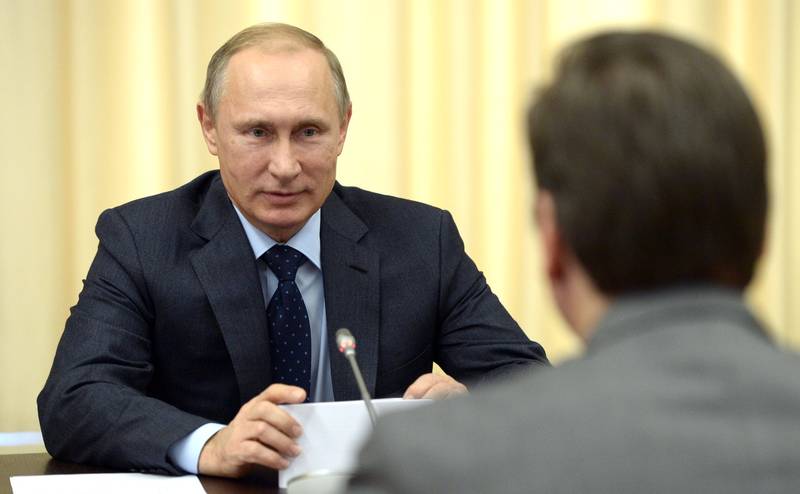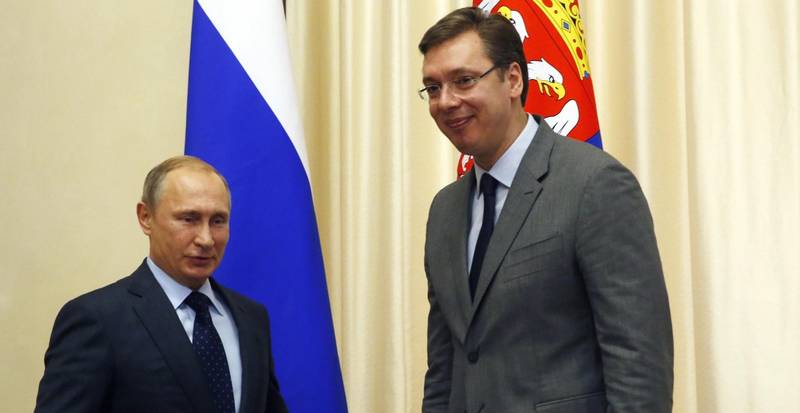Is There an Arms Race Coming to the Balkans?
Adelina Marini, October 31, 2015
 That is the question that many are asking themselves in Croatia after the surprising messages by Serbian Prime Minister Aleksandar Vučić from Moscow this week. He travelled to the Russian capital only two days after participating in the first of its kind summit of countries along the Western Balkans refugee route in Brussels. The main result of this summit in the end of the day was to gather the leaders of Balkan states together at one table and start them talking to each other, mainly on how they can cooperate better in dealing with the unprecedented flow of refugees from Syria, Iraq, and other states from the middle and further East. It becomes clear, however, from Mr Vučić’s statements that these leaders have many other issues to discuss. The lack of dialogue on many of the problems that arose after the bloody disintegration of former Yugoslavia could have far heavier consequences than them accusing each other for not being able to deal with the refugee crisis.
That is the question that many are asking themselves in Croatia after the surprising messages by Serbian Prime Minister Aleksandar Vučić from Moscow this week. He travelled to the Russian capital only two days after participating in the first of its kind summit of countries along the Western Balkans refugee route in Brussels. The main result of this summit in the end of the day was to gather the leaders of Balkan states together at one table and start them talking to each other, mainly on how they can cooperate better in dealing with the unprecedented flow of refugees from Syria, Iraq, and other states from the middle and further East. It becomes clear, however, from Mr Vučić’s statements that these leaders have many other issues to discuss. The lack of dialogue on many of the problems that arose after the bloody disintegration of former Yugoslavia could have far heavier consequences than them accusing each other for not being able to deal with the refugee crisis.
On Thursday, Aleksandar Vučić ended his three-day visit to Russia, where he started negotiations on the re-arming of the Serbian army in the Russian standards. There are no officially published documents or at least thorough press releases on the essence of the deal. Some Russian websites report that it is worth 5 billion dollars, but such a number is not mentioned anywhere official. Only Mr Vučić himself talked about this, explaining that the decision to re-arm was provoked by Croatia, which last summer made a demonstration of its military equipment during the first military parade in many years, organised to celebrate the 20-year anniversary of operation “Storm”, with which Croatia recovered its territorial integrity. Back then, Croatian analysts warned that all this sabre-rattling could prove very dangerous in the current geopolitical situation in the world, which echoes in a special way in the Balkans.
The Croatian military parade in turn was a response to the military parade organised by Serbia a year ago to honour the visit of Russian President Vladimir Putin in Belgrade. The event was in commemoration of the liberation of Belgrade from Nazi occupation with the help of the former Soviet Union. Aleksandar Vučić explained that he was pressed to start re-arming the Serbian army because neighbouring states demonstrated military prowess. “If they ask why we need all this, they should ask themselves the question why some feel they need of weapons, when they are surrounded by NATO states on all sides and only one is not – Serbia”, said Mr Vučić, envisaging Croatia, which is a member of NATO. To this date, Croatia has not announced intention to buy new military equipment. One of the reasons is that it is in a difficult financial situation and it can hardly afford any military upgrade.
Serbia keeps quiet when some are receiving battle helicopters, armoured vehicles, and Howitzers, “You will ask me tomorrow, in a different constellation of powers in the world, what did you do to protect your country. We are not going to purchase offensive weapons, but we need to protect our territory”, he said. Serbia’s decision has already caused nervousness in Croatia. In an interview for Croatian TV channel RTL, deputy PM and Minister of Internal Affairs Ranko Ostojić said that Croatia managed to gain its freedom with just bare guns before, and it would do the same again if needed. He reminded that Croatia is a NATO member, which means it will be protected.
During his visit to Russia, the Serbian PM spoke with President Putin and Prime Minister Dmitry Medvedev about how important stability in the Balkans is. Russia will aid Serbia in hunting down alleged terrorists from ISIS. The Serbian PM complained to Russian media during the joint statements with President Putin that Kosovo was not complying with the hard-reached agreement on Serb municipalities. Kosovo postponed implementing what was agreed while waiting for the Constitutional Court’s ruling on whether the agreement is legal. This happened just days after Kosovo signed in Brussels the Stabilisation and Association Agreement, which is the first step towards EU membership. It was made possible exactly by the efforts of Belgrade and Pristina to have dialogue and negotiate on unsolved issues with EU facilitation, represented by the EU High Representative for Foreign Affairs and Security Policy.
During his visit, Aleksandar Vučić stated in front of Serbian media that someone has interests in destabilising the Balkans region and he knows who it is, but will not say. According to him, it becomes crystal clear if what is going on in the region is analysed. He stated once more that Serbia will do everything possible for peace and stability in the Balkans. Vučić’s appearance in Moscow had nothing to do with the image he presented in Brussels in front of foreign media before and during the summit of the countries along the Western Balkans route. There, he appeared to be the most humble and constructive person of all. In Moscow, he looked confident and enjoying strong support behind his back. Vučić’s visit to Moscow was leading news in Thursday's central news of Serbian national television. The report from Moscow continued more than ten minutes, including an extensive interview with PM Vučić.
 News linked to the coming presentation of the report on Serbia’s progress towards EU membership was left for the end of the broadcast and lasted no more than a minute. Russian agency Novosti published a curious commentary [in Russian] titled “Brothers or Europeans: does Russia need Serbia?”. The author, Anastasiya Melnikova, writes in the commentary that at the moment Serbia, like many other small European states, is forced to manoeuvre. This means accepting euro-integration conditions, following the EU, or attempting to make its own policy “which of course cannot be called independent”.
News linked to the coming presentation of the report on Serbia’s progress towards EU membership was left for the end of the broadcast and lasted no more than a minute. Russian agency Novosti published a curious commentary [in Russian] titled “Brothers or Europeans: does Russia need Serbia?”. The author, Anastasiya Melnikova, writes in the commentary that at the moment Serbia, like many other small European states, is forced to manoeuvre. This means accepting euro-integration conditions, following the EU, or attempting to make its own policy “which of course cannot be called independent”.
The situation in Serbia and most of all around it is especially tense, says the commentary, listing the refugee flow, the demand of some Serbian parties for a referendum on declining EU membership (which was vehemently denied by Vučić as a possibility), and the problems around the normalisation of relations with Kosovo. The protests in neighbouring Montenegro are mentioned, which Montenegrin PM Milo Đukanović blamed on Russia. Moreover, the authoritarian PM of the small Balkan state thinks that the protests against him in Podgorica are actually aimed against its NATO membership bid.
All of this presents new challenges to the European Union. At this stage the European position is that relations with Russia cannot be a condition for membership in the Union, but on the other hand the role of Russia in the Balkans cannot be underestimated and passed by, especially when it has such an important ally as Serbia. Belgrade is expecting the opening of the first negotiation chapters and feels it would be a signal that the EU really wishes Serbia in its ranks. The state is already losing patience and is not very keen on paying a high price for its European membership. However, Serbia not being a EU member could cost the Union dearly, especially in the current geopolitical situation in which the Union is surrounded by conflicts. The biggest challenge will be what to say in the report and how will it affect the opening of the first chapters.
The European Commission made a risky political move by postponing the publishing of the reports on enlargement because of elections in Turkey, which will happen on November 1st, for it is counting on Turkey turning into a buffer zone for refugees. In the name of the refugee flow towards the EU thinning sharply, Commission President Jean-Claude Juncker even expelled European values from the equation. Earlier this week, he said in the European Parliament that talking on human rights, freedom of press, and other problems in the relations between the EU and Turkey will not help the refugee dialogue. Serbia would not tolerate a different treatment, which means it will also not tolerate the issues with Kosovo, rule of law, and relations with Russia stand on its way in the negotiations process. Such a development would be catastrophic to the EU, especially at the background of sabre-rattling in the Balkans, where such things never end well.
The problems in the Balkans pose one more important question – whether in the long run it is sustainable to have a state being a EU member, but not a NATO member and vice versa. Serbia has so far stated its unwillingness to become NATO member. Turkey has been a member of NATO for a long time, but its path towards the EU is getting harder and longer. In the long run, this poses some questions on common interests and security on the European continent.
Translated by Stanimir Stoev
 Bakir Izetbegovic, Andrej Plenkovic | © Council of the EU
Bakir Izetbegovic, Andrej Plenkovic | © Council of the EU Aleksandar Vucic, Recep Tayyip Erdogan | © Serbian Presidency
Aleksandar Vucic, Recep Tayyip Erdogan | © Serbian Presidency Jean-Claude Juncker, Zoran Zaev | © European Commission
Jean-Claude Juncker, Zoran Zaev | © European Commission